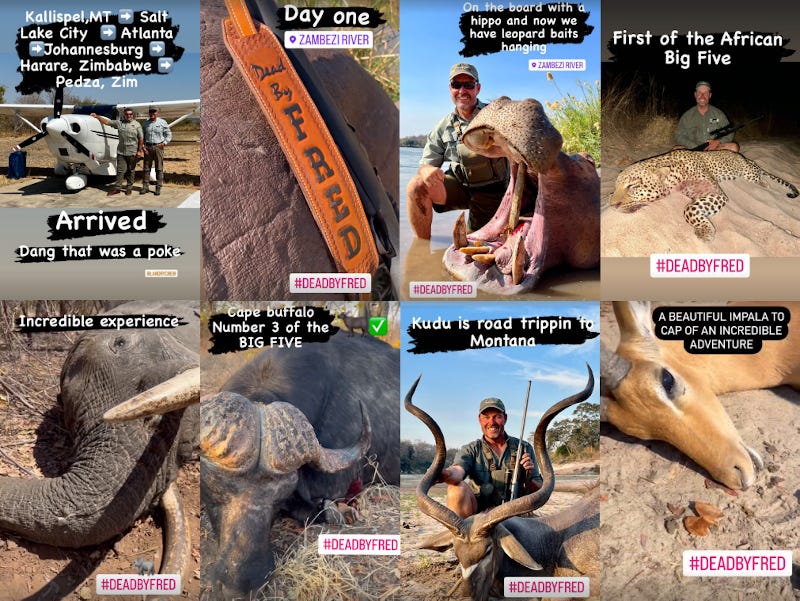REDD in tooth and claw: Trophy hunting and the Kariba REDD+ project
Warning: this article includes disturbing photographs.
Here’s how the carbon credit broker South Pole describes project activities at the Kariba REDD project:
the establishment of nutritional gardens, conservation agriculture, promotion of efficent [sic] cookstoves, forest fire prevention and management, and enhanced wildlife conservation.
Somehow missing from this list is trophy hunting - rich white men flying into Zimbabwe to kill animals for fun.
Shooting elephants, leopards, buffaloes
In a new article, Follow the Money reveals that a company called Charlton McCallum Safaris is operating on land that overlaps with the Kariba REDD project.
On the left is a map from a 2016 Monitoring and Implementation Report with the REDD project area coloured blue, safari areas are yellow, and national parks are green. On the right is a map showing Charlton McCallum’s safari blocks are coloured red, other safari areas are brown, and national parks are green:
Follow the Money reports on Fred Fanizzi’s visit to the Dande region in Zimbabwe in August 2022. He booked his trip through Charlton McCallum Safaris.
Fanizzi lives in Montana, USA. His Instagram account has many photographs of animals he’s killed.
In one video, Fanizzi says,
“Alright, it is Monday, August the 29th, and I’m sitting right here behind a beautiful leopard in Dande region in Zimbabwe, Africa. . . . I am on top of the world. For me this is the first of the African Big Five. A lifetime dream. And he is dead by Fred. It’s been a really good day.”
The African Big Five refers to the lion, leopard, rhinoceros, elephant, and buffalo.
“Dead by Fred” is written on Fanizzi’s gun strap. On his first day hunting in Zimbabwe, Fanizzi killed a hippopotamus. He posed with it on the banks of a river with a stick holding the hippo’s mouth open.
The hippo was bait. It was skinned, chopped into smaller pieces, and hung in a tree to attract a leopard. Fanizzi waited in a specially built thatched blind, about 15 metres from the tree. When the leopard turned up he shot it.
While he was in Zimbabwe, he also killed a large bull kudu, a “very rare” bush pig, an elephant, a Cape buffalo, and an impala. He described the impala as “beautiful” and shooting the elephant as an “incredible experience”.
Earlier this year, Die Zeit, Swiss broadcaster SRF, and Follow the Money visited the Kariba REDD project area with Zimbabwean journalists. In July 2023, they published a series of articles about Kariba.
In his new article for Follow the Money, Ties Gijzel writes,
We found hardly any tangible results of the claimed conservation work, but instead, muddled and incomplete financial documentation.
But the journalists from Die Zeit, SRF, and Follow the Money discovered a link between the Kariba REDD project developer, Steve Wentzel, and trophy hunting inside the project area. Wentzel told Gijzel not to read anything into it, saying, “We tried to do the right thing: reduce the number of animals being culled.”
The journalists found that Wentzel’s hunting business is bigger than they had assumed. Gijzel writes that,
Wentzel appears to have built a controversial two-tiered operation: in addition to selling carbon credits, he also profits from trophy hunting in his nature reserve.
Peter Graham Hingeston of HKK Safaris told Follow the Money that “We paid Wentzel for the hunting rights. During 2018 and 2019, we paid him hundreds of thousands of dollars.”
Hingeston told Follow the Money that in October 2020, another safari company, Dalton & York Safaris, took over the hunting rights.
Dalton & York’s website includes a Trophy Gallery, featuring dead elephants, buffaloes, lions, leopards, hippos, crocodiles, zebras, antelopes and a giraffe. Posing next to the dead animals are the grinning white men who killed them.
The company’s Instagram is even more brutal. In one photo, a white man holds up a leopard with the blood from the dead animal dripping down his arms.
When Heidi Blake of The New Yorker asked Wentzel about trophy hunting, he acknowledged that it happens across the project area. Wentzel says,
“Some pictures you don’t need to post on Instagram. Dalton & York safaris are young guys, very enthusiastic, too enthusiastic sometimes, brought up with this hunting mindset; it’s a bit barbaric. You look at it and understand it, but they see it as a marketing thing for the Hunting Convention in Dallas, and the bigger the animal, the better clients they get.”
Wentzel says that Dalton & York clients pay him US$250 per night in his safari camp in the project area. “We share that with the community,” Wentzel told The New Yorker.
Follow the Money writes that, “South Pole, which previously said trophy hunting is not part of the project, does not want to respond.”
Carbon standards organisation Verra did respond to Follow the Money:
It is new information to Verra that we need to analyze. it is unlikely that projects engaging in trophy hunting activities would meet the rules and requirements of Verra’s programs. If these new allegations are deemed credible, options Verra might consider include opening a Section 6 review which will suspend further issuance.








Wow, Verra might actually do something worthwhile? But this game-hunting mess follows the same thought lines as the "offsets" projects- Africa is the "backyard" for the rich North, we can use their forest land to ease our conscience about emissions via offsets, and of course, we need Africa for the fun of safaris and killing. A real hunter runs after the animal until it if out of breath and kills it with a knife, not at all like these rich white guys with rifles and entrapment. Every bit of this story is a sad commentary on human behavior, meanwhile we will hit a new record of CO2 levels this year https://phys.org/news/2023-10-carbon-dioxide-pollution.html
Sick and sickening. Hunting for food I will accept. Finding pleasure in killing beautiful animals for fun, I do not.